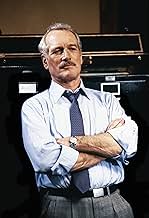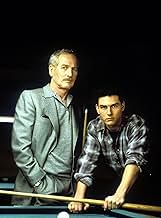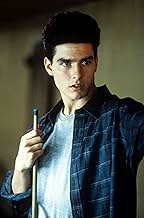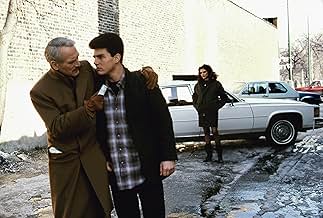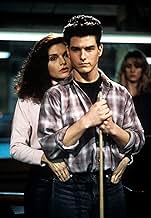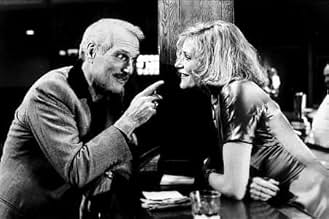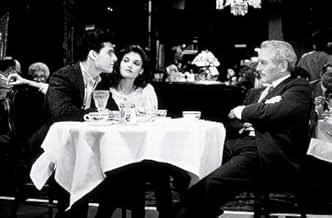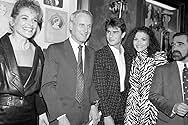Fast Eddie Felson teaches a cocky but immensely talented protégé the ropes of pool hustling, which in turn inspires him to make an unlikely comeback.Fast Eddie Felson teaches a cocky but immensely talented protégé the ropes of pool hustling, which in turn inspires him to make an unlikely comeback.Fast Eddie Felson teaches a cocky but immensely talented protégé the ropes of pool hustling, which in turn inspires him to make an unlikely comeback.
- Director
- Writers
- Stars
- Won 1 Oscar
- 3 wins & 10 nominations total
- Director
- Writers
- All cast & crew
- Production, box office & more at IMDbPro
Featured reviews
There are two possible reviews that could be written about this film; two kinds, that is. One kind comes from somebody who's never seen "The Hustler" (1961), who's main character, Fast Eddie Felson, played by Paul Newman, is here reprised and replayed by the same actor, after 25 years has gone by, in a new script. I'm curious to read a review of this kind. I've seen "The Hustler" and rank it very high on my list of great films. So I can only write a review of this other kind. If you know the story from "Hustler" (and love it), how can you not be interested in what happens to Fast Eddie later in life? I was immediately aware of the extension of ideas (money, excellence, honor, pride, and deceit) from "The Hustler" and curious to see where Scorsese would take them. I think he's true to the time period: the clothing (and Vince's hair!), the music (very 80's), and the shift of values (as compared to 60s; e.g. cocaine replacing alcohol). Fast Eddie is also true to his age (and former excellence as a hustler). It feels like he's inherited a bit of Bert (from "The Hustler), a festering bitterness and pride, which reemerges when he meets Vince. I actually liked Tom Cruise as the innocent Vince and thought he played him perfectly. I winced to see him lose that innocence, which is probably what the film means to do. Mastroantonio is also pretty fabulous and yet no where near as cognizant and complex as Piper Laurie's character in "The Hustler." In that respect, this film is not as "cool" as "The Hustler." To credit Scorsese, he avoids trying to make a film as cool or similar in look to the original. Also, this movie does not attempt to gloss over Fast Eddie's faults (indeed it focuses on them intensely), and it doesn't mean to have him come to some redemption (although he does return to some of his former glory as a pool player). For me, my interest in the development of the story hinges upon my knowledge of what happened in "The Hustler." There was no way I could separate this fact from my judgement of the movie. I was disappointed only in so far that I wasn't watching "The Hustler" instead; and that's unfair to this movie. So, I don't know how this movie stands on its own. Try to imagine a movie about Rick, reprised by Bogart, from "Casablanca" 25 years later, called "The Taste of Defeat" when he's living in Paris, bloated from drink and lamenting the loss of swing jazz and, alas, his only love,Ilsa, etc etc.
"Fast Eddie" Felson (Paul Newman) is an aging liquor salesman and retired billiards professional who spots the talent of a cocky young player Vincent (Tom Cruise) and offers to teach him to be an even better player. With his girlfriend Carmen (Mary Elizabeth Mastrantonio), Vincent accepts the offer and the trio begins a long road trip touring many pool halls across the country, with Vincent winning and losing intentionally to create a specific reputation and to hustle more money than he would gain otherwise. Eventually Eddie also finds his long lost knack for the game.
Paul Newman's natural charisma carries the film with ease, but the movie is not without its problems. Tom Cruise's overflowing energy and self-confidence are an intentional part of his character's style, sure, but I feel he is overdoing the cockiness to the point of being just irritating. The third main character Carmen is left more in the background but Mastrantonio looks rather fragile for such a role, as the vibe I was getting from her character was more rough and experienced than the innocent-looking actress could convey. The supporting actors do a good job though, such as Forest Whitaker as an unexpectedly good pool shark Amos and John Turturro as an antagonistic rival to Eddie and Vincent.
Another thing that bothered me about the film was the restless camera-work. There is a lot of movement: turning, zooming, tracking, some quick cuts – something I found distracting. In certain scenes it works fine though, such as during the spinning long take of Vincent's game against Moselle (Bruce A. Young). The other pool playing scenes are mostly well done too, especially during the finale at the big tournament.
The Color of Money may not be Scorsese's best film by a long shot, but it is entertaining alright and contains some exciting billiards scenes, so fans of the game ought to check it out. The drama, namely the development of the relationship between young Vincent and the father figure-like Eddie works well enough too. 'A decent film, but no masterpiece' is my verdict.
Paul Newman's natural charisma carries the film with ease, but the movie is not without its problems. Tom Cruise's overflowing energy and self-confidence are an intentional part of his character's style, sure, but I feel he is overdoing the cockiness to the point of being just irritating. The third main character Carmen is left more in the background but Mastrantonio looks rather fragile for such a role, as the vibe I was getting from her character was more rough and experienced than the innocent-looking actress could convey. The supporting actors do a good job though, such as Forest Whitaker as an unexpectedly good pool shark Amos and John Turturro as an antagonistic rival to Eddie and Vincent.
Another thing that bothered me about the film was the restless camera-work. There is a lot of movement: turning, zooming, tracking, some quick cuts – something I found distracting. In certain scenes it works fine though, such as during the spinning long take of Vincent's game against Moselle (Bruce A. Young). The other pool playing scenes are mostly well done too, especially during the finale at the big tournament.
The Color of Money may not be Scorsese's best film by a long shot, but it is entertaining alright and contains some exciting billiards scenes, so fans of the game ought to check it out. The drama, namely the development of the relationship between young Vincent and the father figure-like Eddie works well enough too. 'A decent film, but no masterpiece' is my verdict.
The Color of Money is a slick sequel to The Hustler where Paul Newman as a much younger man paid the price for hustling pool. Now, twenty some years later, his Fast Eddie Felson is driving around in a big fancy Cadillac selling liquor and stake-horsing younger pool players. One day, while romancing his bartender girlfriend, his young protégé (John Tuturro) gets whipped by this cocky kid named Vincent. Eddie Felson is immediately drawn to the flaky, loud-mouthed kid with the name "Vince" stenciled on his tee shirt. After some arm twisting and manipulating, Eddie, Vincent, and Vincent's streetwise girlfriend Carmen (Mary Elizabeth Mastrantonio) are making their way to Atlantic City where a 9 Ball pool tournament awaits. Along they way Eddie tries to teach them how to hustle pool. This will be a problem because of course the cocky youngster won't do as he's told. He has a gift and knows it. It is simply impossible for him to hold back and let someone beat him. Even when it could lead to a bigger payoff down the road. His girlfriend Carmen also seems to see both Vincent and Eddie as a way to make money for herself. She is clearly a woman with motives all her own. Of course this will all lead up to a climatic match in Atlantic City between the old master and the young protégé, won't it? Well, it appears to for a moment, until we learn that what we saw wasn't really what it appeared to be.
And that's the part of the film that seemed to really irk Roger Ebert in his review. He was expecting a masterpiece of a film for no other reason than Martin Scorcese is the director. But the film isn't a masterpiece. Its simply a very good film with some great performances, great music, and some gritty and authentic-looking locations. Who is the better pool player is the last thing this film is about. This is a film about people using other people. Be it for money, inspiration, comfort, you name it. Newman plays Felson here as a gruff, seasoned man who thinks he knows everything about the game, and those who play it. He finds out as the film moves along that is not always the case. Sometimes these younger players have new tricks up their sleeves, and if you let your guard down, they will hustle even the smartest old timer. There is a classic scene where Eddie, after a few too many drinks, allows a chubby and apparently dim-witted Forest Whitaker to take him for hundreds of dollars. The film is full of scenes that end in ways you don't quite expect.
This is one of those movies where above all else, the casting was almost perfect. Newman is as watchable as ever. Mastrantonio steals a few scenes. Cruise is annoying of course, but he was supposed to be. Still, he looks kind of weak compared to the other actors. Great support from Helen Shaver and Bill Cobbs, too. Watch closely for an appearance from music icon Iggy Pop. During a montage, Cruise hustles him and then steals a shot of booze right out of his hand! The cinematography from Michael Ballhaus is great as always. In fact its too good! Some of the camera shots just look too stylish for such a film. Maybe that was Scorcese's way of trying to liven up a picture with so little violence! Overall, The Color of Money is worth your time. 8 of 10 stars.
The Hound
And that's the part of the film that seemed to really irk Roger Ebert in his review. He was expecting a masterpiece of a film for no other reason than Martin Scorcese is the director. But the film isn't a masterpiece. Its simply a very good film with some great performances, great music, and some gritty and authentic-looking locations. Who is the better pool player is the last thing this film is about. This is a film about people using other people. Be it for money, inspiration, comfort, you name it. Newman plays Felson here as a gruff, seasoned man who thinks he knows everything about the game, and those who play it. He finds out as the film moves along that is not always the case. Sometimes these younger players have new tricks up their sleeves, and if you let your guard down, they will hustle even the smartest old timer. There is a classic scene where Eddie, after a few too many drinks, allows a chubby and apparently dim-witted Forest Whitaker to take him for hundreds of dollars. The film is full of scenes that end in ways you don't quite expect.
This is one of those movies where above all else, the casting was almost perfect. Newman is as watchable as ever. Mastrantonio steals a few scenes. Cruise is annoying of course, but he was supposed to be. Still, he looks kind of weak compared to the other actors. Great support from Helen Shaver and Bill Cobbs, too. Watch closely for an appearance from music icon Iggy Pop. During a montage, Cruise hustles him and then steals a shot of booze right out of his hand! The cinematography from Michael Ballhaus is great as always. In fact its too good! Some of the camera shots just look too stylish for such a film. Maybe that was Scorcese's way of trying to liven up a picture with so little violence! Overall, The Color of Money is worth your time. 8 of 10 stars.
The Hound
The Color of Money (1986)
The reputation of this films rides partly on its director, a mainstream Martin Scorsese, and on the previous film it bounces off of (and makes vague reference to), The Hustler. Key to both films is the astonishing Paul Newman, who holds his end of the stick and then some. The rest of the cast is purely in canned and competent support roles, or in semi-star roles by two young actors with some screen presence but no great subtle skill to match Newman's.
I'm speaking not only of Mary Elizabeth Mastrontonio, who is forced to play the slightly tough, slightly sexy, generally submissive girlfriend, but also of Tom Cruise, who is brilliant at being "flakey" partly because he is in real life, from all accounts. You give Scorsese credit here for using the young actor in a role that matches his natural persona, in contrast to others, including Spielberg, who seem to make more of the actor than there is, and a certain falseness gets in the way. But this film uses the awkwardness and naive, boyish qualities of Cruise as a sudden pool shark really well.
What holds it all back? I think basically plot. I mean, it's fun to see the big hustle at play, and to get stung once or twice when things aren't what they seem. But we sort of know going in that that's the general plan, and then it happens. And it takes a long time happening...there are no (no) complications here, beyond pool and hustling. The romances, for what they are worth, a completely thin, and didn't have to be. The settings, all these great (great) poolhalls and small town joints are terrific, populated a little too perfectly by locals of all different stripes. The camera-work makes some fairly cinema verite footage make sense in the scenes, but not with either edge or lyricism.
This all sounds a little like I'm working hard to point out the flaws, and I must go back to where I started about Newman, and the basic strength of the aging pool player facing a change in his personal scenery. It's a canned affair overall. Well done, sure, but without the richness of the best of Scorsese's work, or the best of Hollywood, for that matter, including the preceding The Hustler, which you might see in a pairing with this one.
The reputation of this films rides partly on its director, a mainstream Martin Scorsese, and on the previous film it bounces off of (and makes vague reference to), The Hustler. Key to both films is the astonishing Paul Newman, who holds his end of the stick and then some. The rest of the cast is purely in canned and competent support roles, or in semi-star roles by two young actors with some screen presence but no great subtle skill to match Newman's.
I'm speaking not only of Mary Elizabeth Mastrontonio, who is forced to play the slightly tough, slightly sexy, generally submissive girlfriend, but also of Tom Cruise, who is brilliant at being "flakey" partly because he is in real life, from all accounts. You give Scorsese credit here for using the young actor in a role that matches his natural persona, in contrast to others, including Spielberg, who seem to make more of the actor than there is, and a certain falseness gets in the way. But this film uses the awkwardness and naive, boyish qualities of Cruise as a sudden pool shark really well.
What holds it all back? I think basically plot. I mean, it's fun to see the big hustle at play, and to get stung once or twice when things aren't what they seem. But we sort of know going in that that's the general plan, and then it happens. And it takes a long time happening...there are no (no) complications here, beyond pool and hustling. The romances, for what they are worth, a completely thin, and didn't have to be. The settings, all these great (great) poolhalls and small town joints are terrific, populated a little too perfectly by locals of all different stripes. The camera-work makes some fairly cinema verite footage make sense in the scenes, but not with either edge or lyricism.
This all sounds a little like I'm working hard to point out the flaws, and I must go back to where I started about Newman, and the basic strength of the aging pool player facing a change in his personal scenery. It's a canned affair overall. Well done, sure, but without the richness of the best of Scorsese's work, or the best of Hollywood, for that matter, including the preceding The Hustler, which you might see in a pairing with this one.
25 years after Paul Newman starred as "Fast" Eddie Felson in The Hustler (1961), he reprised his role and teamed up with another legend in Martin Scorsese to bring us The Color of Money (1986). Undoubtedly stylish and entertaining, it seems to lack the depth and atmospheric feel of "The Hustler". Cruise gives an honest but not terribly likeable performance as Vincent Lauria and Mary Elizabeth Mastrantonio does well with what she's given. I think the problem was some of the performances came off slightly cartoonish, though I suppose it's difficult to fully recapture the realism and magic that we had with "The Hustler", far and away one of the greatest films of the '60s. Scorsese takes a different approach here and allows his art of a filmmaker to shine through during the pool scenes, which are handled fairly artistically through innovative angles and shots (no pun intended). It's most certainly got style but the substance just wasn't what it could have been given where it's come from.
What Scorsese Film Ranks Highest on IMDb?
What Scorsese Film Ranks Highest on IMDb?
Cinema legend Martin Scorsese has directed some of the most acclaimed films of all time. See how IMDb users rank all of his feature films as director.
Did you know
- TriviaTom Cruise did his own trick shots for the film, except for one in which he had to jump two balls to sink another. Martin Scorsese said he could have let Cruise learn the shot, but it would have taken two extra days of practice, holding up production and costing thousands of dollars. The shot was instead performed by professional players Andrew Ghiatsidis & Michael Sigel.
- GoofsIt has been purported that the jump shots depicted in the film are illegal moves. Jump shots are legal in nine-ball.
- Quotes
Eddie Felson: Money won is twice as sweet as money earned.
- Crazy creditsDog Walkby Zoë
- How long is The Color of Money?Powered by Alexa
Details
Box office
- Budget
- $14,500,000 (estimated)
- Gross US & Canada
- $52,293,982
- Opening weekend US & Canada
- $6,357,877
- Oct 19, 1986
- Gross worldwide
- $52,293,982
- Runtime
- 1h 59m(119 min)
- Color
- Aspect ratio
- 1.85 : 1
Contribute to this page
Suggest an edit or add missing content





